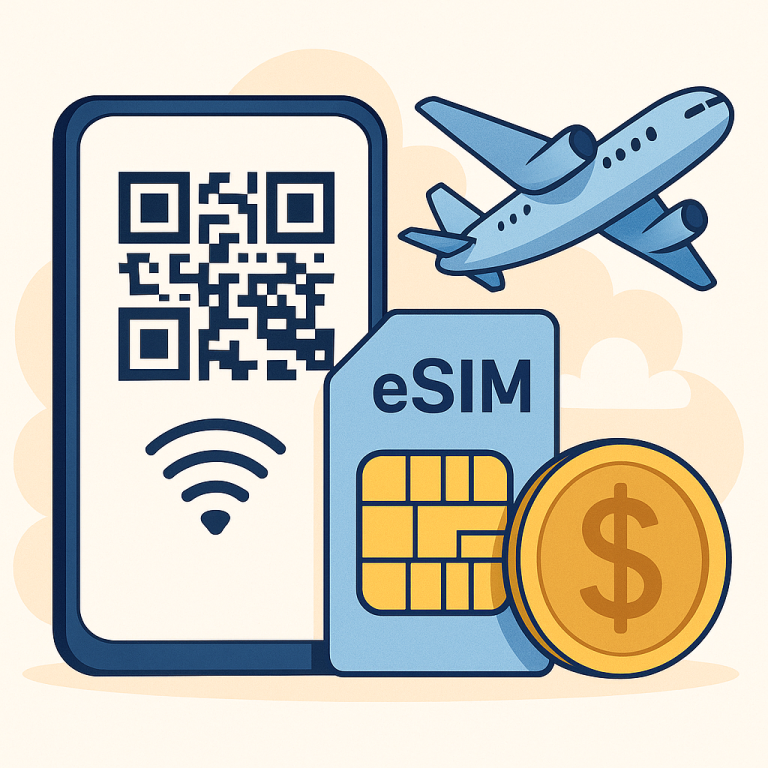Modern travelers face an important choice when planning their mobile connectivity in Israel. The decision between eSIM and physical SIM cards impacts your entire travel experience. As technology evolves, understanding these options becomes crucial for seamless communication. Smart travelers carefully evaluate both choices before their journey begins. Your selection affects everything from pre-trip preparation to daily usage in Israel.
Understanding the Basics
What is an eSIM?
An eSIM represents the latest advancement in mobile connectivity technology for international travelers. This digital SIM card exists entirely within your device’s internal system, eliminating physical components. No physical card insertion is necessary for activation or use throughout your journey. The technology transforms traditional mobile connectivity into a purely digital experience. Modern devices increasingly embrace this innovative solution for traveler convenience.
![]()
Traditional Physical SIM Cards
Physical SIM cards have served as the standard mobile connectivity solution for decades. These removable plastic cards contain a small chip storing your mobile information. Most travelers are familiar with their simple plug-and-play nature and widespread availability. Local stores across Israel stock various physical SIM options for tourists. These cards maintain popularity among travelers with older device models.
Convenience Comparison
eSIM Advantages
Installing an eSIM requires only scanning a QR code or downloading a profile. Users can activate their service before arriving in Israel, ensuring immediate connectivity. Multiple eSIM profiles can exist simultaneously on one device for flexible usage. The digital nature eliminates common travel hassles like lost or damaged cards. Instant activation means no waiting time or store visits during your trip.Plus, you can recharge whenever you want.
Physical SIM Drawbacks
Traditional SIMs require visiting a store or waiting for mail delivery before use. Travelers must physically swap cards when changing providers or plans during their stay. Storage and handling of tiny SIM cards creates risk of loss or damage. Finding store locations and managing business hours can waste valuable vacation time. Language barriers might complicate the purchase process in physical stores.
Device Compatibility
eSIM Requirements
Modern smartphones increasingly support eSIM technology, especially newer iPhone and Android models.For a list of supported devices, click here. However, older devices may lack eSIM capabilities entirely, limiting user options. Check your device compatibility before choosing this option for your Israeli journey. Manufacturer websites provide detailed eSIM compatibility information for different models. Some devices support both eSIM and physical SIM simultaneously.
Physical SIM Universality
Most mobile devices accept standard physical SIM cards without compatibility issues. Different devices require different SIM sizes (Standard, Micro, or Nano) for proper function. Adapters can help match SIM sizes to device requirements when necessary. Physical SIMs work reliably across almost all phone models and brands. This universal compatibility remains their biggest advantage for many travelers.
Cost Considerations
Initially, pricing plays a crucial role in choosing between eSIM and physical options.
eSIM Pricing
Firstly, digital delivery reduces operational costs for eSIM providers in Israel substantially. Moreover, special promotions often make eSIM packages more affordable than physical alternatives. Subsequently, providers pass these savings directly to customers through competitive pricing. Furthermore, no additional fees exist for SIM card production or delivery. Meanwhile, digital nature allows for instant price updates and special offers.
Physical SIM Expenses
In contrast, traditional SIM cards include production and distribution costs in their pricing. Additionally, some providers charge extra fees for physical SIM card replacement. Furthermore, shipping costs may apply when ordering before travel to Israel. Nevertheless, bulk purchases might offer some cost savings for longer stays. However, unexpected replacement costs can arise from loss or damage.
Network Coverage
eSIM Performance
Above all, both connection types offer identical network coverage across Israel. Consequently, eSIMs connect to the same towers as physical SIM cards seamlessly. Meanwhile, signal strength remains consistent regardless of SIM type chosen. Furthermore, network optimization works equally well for both options. Additionally, roaming capabilities function similarly for both SIM types.

Activation Process
eSIM Setup
First and foremost, digital activation typically completes within minutes through simple steps. Subsequently, clear instructions guide users through the QR code scanning process. Moreover, customer support assists with any activation challenges immediately. Furthermore, online tutorials provide additional guidance when needed. Meanwhile, instant activation confirmation ensures peace of mind.
Physical SIM Installation
On the other hand, traditional card installation requires careful handling and correct orientation. Additionally, some users find the physical installation process challenging or stressful. Subsequently, store visits may require waiting times during busy periods. Furthermore, technical assistance might be limited in some locations. Nevertheless, experienced travelers often manage installation easily.
Travel Flexibility
eSIM Benefits
Initially, travelers can switch between multiple eSIM profiles without changing physical cards. Moreover, international travelers appreciate storing multiple country profiles simultaneously. Subsequently, emergency backup plans activate instantly when needed during trips. Furthermore, profile management happens entirely through user-friendly apps. Additionally, switching between plans requires no physical handling.
Physical SIM Limitations
In contrast, changing physical cards while traveling risks loss or damage. Additionally, storage of multiple SIM cards becomes cumbersome during travel periods. Furthermore, switching between providers requires physical card swapping and handling. Meanwhile, maintaining multiple active plans requires multiple physical devices. Nevertheless, some travelers prefer tangible card management.



